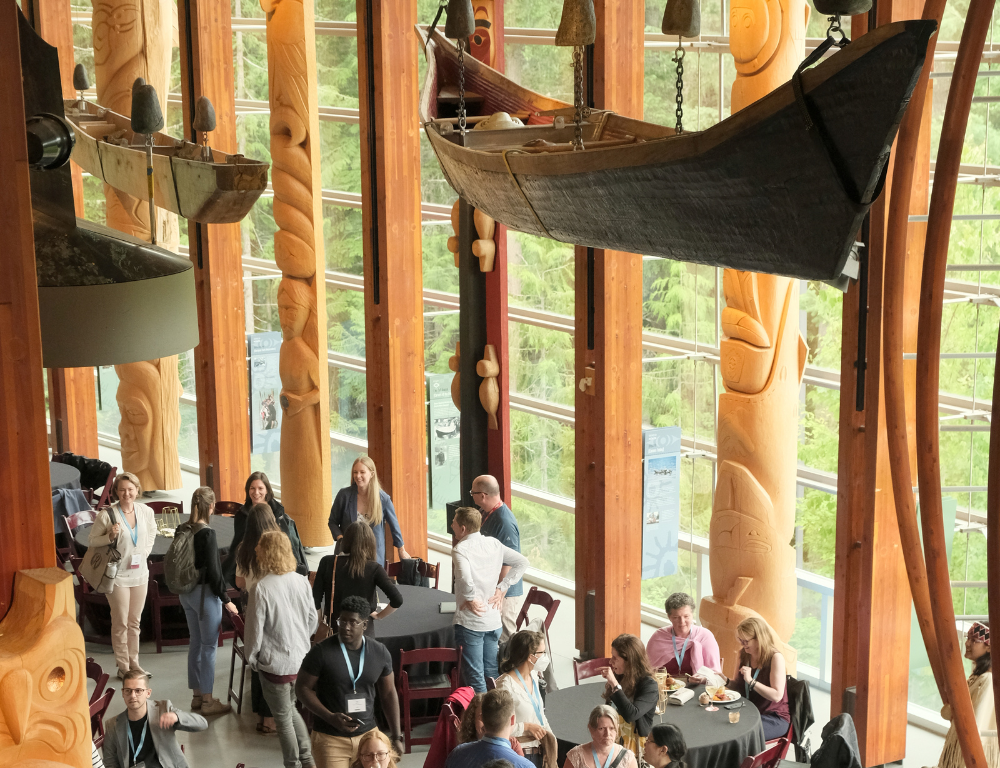2024 Annual Report
Aaniin, Boozhoo! Ullakut! Hello, Bonjour!
CIP respectfully acknowledges our office is located on the unceded territory of the Anishinaabe Algonquin Nation. CIP values the ongoing stewardship of all First Nations, Inuit, and Métis peoples.
Letter from Our President, Lesley Cabott RPP, FCIP, ICD D

Dear Members,
2024 was a year of transformation for the Canadian Institute of Planners, one that truly reflected our value of agile wayfinding. As we navigated leadership transitions, shifting political landscapes, and an evolving professional environment, we remained grounded in our mission to serve our members and strengthen the planning profession from coast-to-coast-to-coast.
This past year, we bid farewell to our CEO, Beth McMahon, whose dedication and vision have left a lasting impact on the Institute. On behalf of the Board, I want to extend our heartfelt thanks to Beth for her years of exceptional leadership. I would also like to express our deep appreciation to Karen Meades for stepping into the role of Interim CEO with grace, clarity, and steady guidance during this important time of change.
We are also grateful to our outgoing executive committee: Dan Huang RPP, MCIP (President), Doug Daniels RPP, MCIP (Treasurer), and Jenna Schroeder RPP, MCIP (Vice President) for their leadership and service to CIP’s membership. Their efforts, along with those of all Board members who completed their terms in 2024, have helped chart a clear and inspiring path forward. Your contributions to the Institute have been invaluable.
As we look toward 2025, CIP is poised to be a stronger voice on key issues shaping our communities. This means ensuring planners have seats at the right decision-making tables, strengthening our sense of professional community, and building public awareness of the planning profession. We will also continue to work towards advancing a more inclusive and equitable profession where all planners can have long, effective, and satisfying careers.
In 2024, we laid a strong foundation and deepened our connections. In 2025, we will turn those connections into action. Together, we will champion the essential role of planners in addressing the most pressing issues of our time. The Institute will create opportunities for planners to lead, innovate, and improve quality of life across the country.
Thank you to each and every one of you for your passion, commitment, and engagement. Our members make CIP what it is today, and your voices will shape what it becomes tomorrow. I look forward to working alongside you as we build vibrant, inclusive, and resilient communities that Canadians are proud to call home.
Cheers,

Lesley Cabott RPP, FCIP, ICD D
President, Canadian Institute of Planners


As of 2024, CIP is now almost 10,000 members strong. This important milestone was made possible thanks to the loyalty of every member, past and present, who has placed their trust in CIP as the voice of Canada’s planning profession since 1919. Thank you, CIP members for your commitment, loyalty, service, and support of the Institute. We are strong because of you.
Our members are the heart of CIP, driving innovation, leadership, and excellence in the planning profession. In 2024, we were proud to recognize and celebrate their outstanding contributions through awards, volunteer initiatives, and our digital badge program.
Congratulations New MCIPs
In 2024, CIP was proud to welcome 346 new MCIPs. For decades, the MCIP® title has united members of the planning profession. For professional members, it serves as a representation of years of hard work and dedication.
Members of the Canadian Institute of Planners (MCIP®) are actively engaged in the planning profession and are a Registered Professional Planner (RPP), Licensed Professional Planner (LPP), urbaniste, or equivalent fully certified member residing in Canada.
How We’re Taking Action on Issues That Matter to You
In 2024, CIP focused on building connections that will help drive real change in 2025.
Take a look at how CIP took meaningful action on our five action issues: Climate Change, Healthy Communities, Housing, Equity, Diversity, and Inclusion (EDI), and Reconciliation for members throughout the year.
Career Support for Life
With 793 conference registrants, 207 Path enrollments, and 21 Student Liaisons, we’re proud to nurture the next generation of planners while enhancing lifelong learning for all. Building on the connections made in 2024, CIP will focus on empowering members to use their voices and take meaningful action in 2025 through deeper engagement and applied learning.
CPL Reporting
In 2024, CIP continued to deliver on its commitment to supporting planners at every stage of their careers through accessible, practical, and impactful resources.
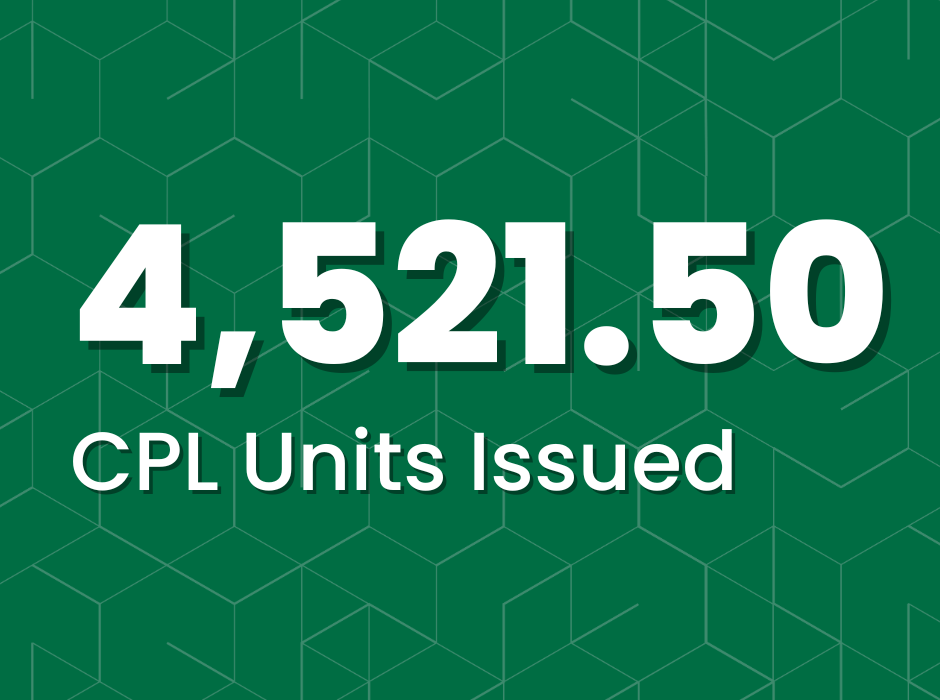
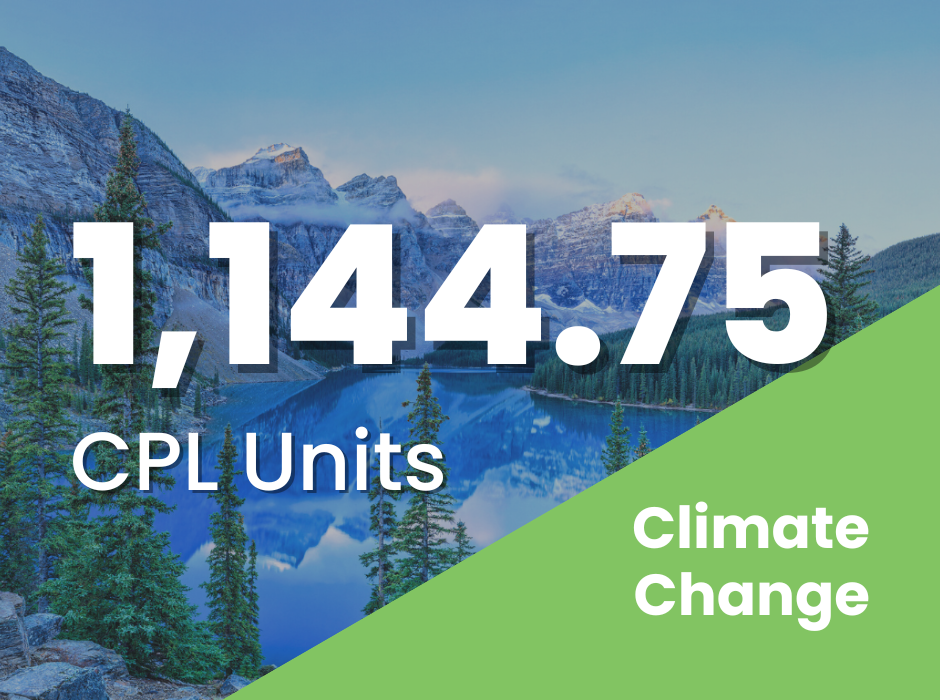
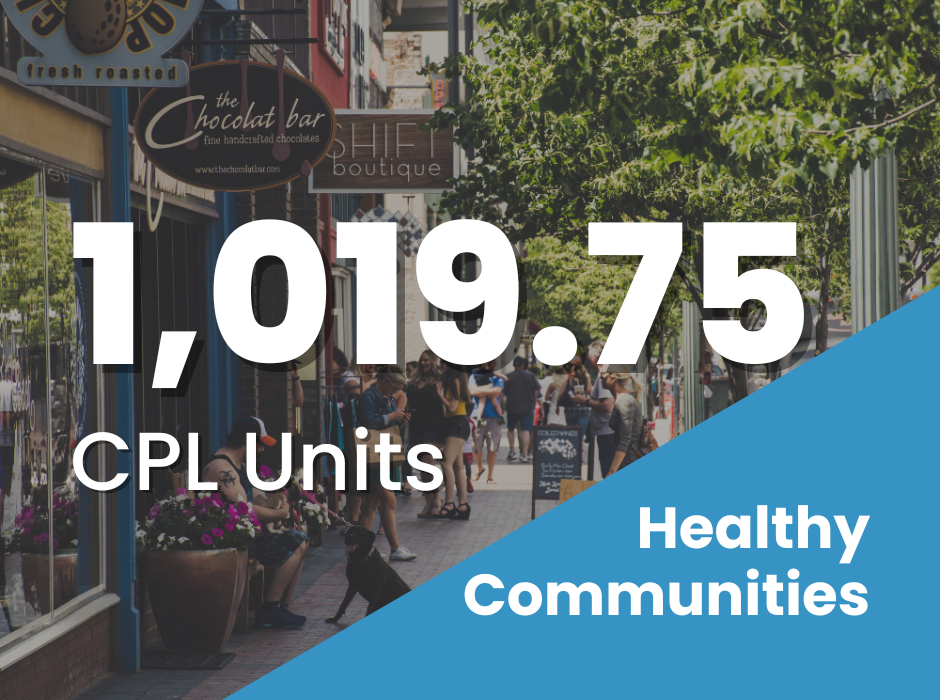



National Conference
CIP’s annual national conference combines professional planning education and research, experiential workshops, networking, career development, and fun over three days.
We expanded our career support for life services with robust professional development opportunities at our national conference, including a resume clinic, free headshots, and career-focused programming for planners at all levels. Our Emerging Leaders Program attracted 117 applicants, providing early- to mid-career professionals with tools for goal setting, relationship building, and self-care.

Plan Canada
Plan Canada, one of CIP’s most valued member services, published four issues in 2024 exploring key themes such as safety, water (in partnership with the Canadian Water Network), progressive planning policies, and housing supply in our first-ever People’s Choice edition. We also continued our popular Plan Canada webinar series, which connected authors and readers for a discussion on the issue’s theme.

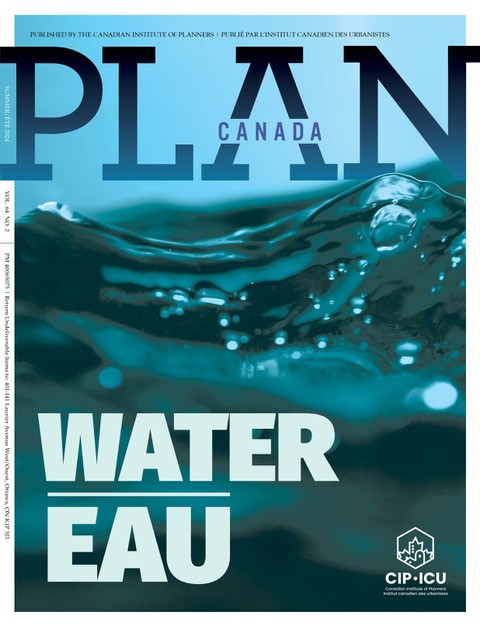
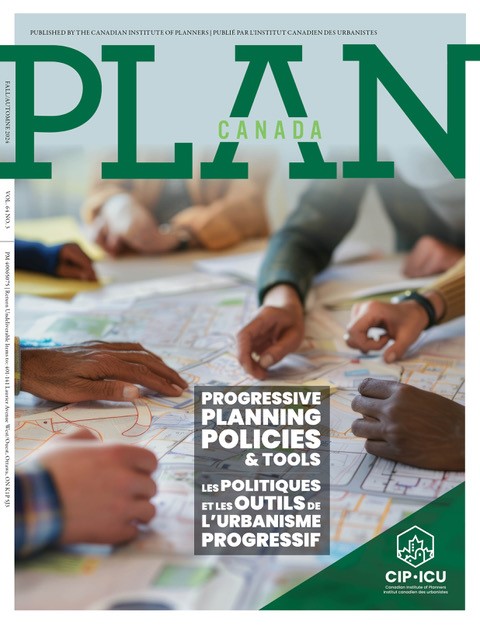
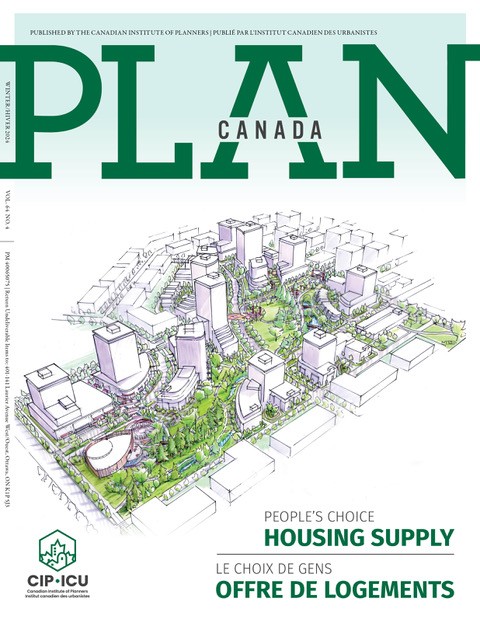
Honours & Awards
Our members are the heart of CIP, driving innovation, leadership, and excellence in the planning profession. In 2024, we were proud to recognize and celebrate their outstanding contributions through awards, volunteer initiatives, and our digital badge program.
This year marked the exciting revival of CIP’s awards for excellence program, honouring the most impactful and transformative planning initiatives across Canada. These awards highlight the talent, dedication, and creativity of planners who work to build stronger, more sustainable communities.
College of Fellows
Fellowship in the Canadian Institute of Planners is the highest honour that can be bestowed upon a planner.


Andy Yan is the director of The City Program and an Associate Professor of Professional Practice in Urban Studies at Simon Fraser University (SFU). Prior to his SFU appointment, Andy had extensively worked in the non-profit and private urban planning sectors with projects in the metropolitan regions of Vancouver, San Francisco, New York City, Los Angeles, and New Orleans. Andy holds a master of Urban Planning from the University of California – Los Angeles and a Bachelor of Arts with first-class honours distinctions in Geography and Political Science from Simon Fraser University. His research interests include housing policy, neighbourhood development and regeneration, immigration, and urban and demographic data analytics, visualization, and storytelling. He also maintains ongoing research and professional interests in the historic and contemporary development of Chinatowns and other immigrant neighbourhoods in North America. Andy is also on the Board of Directors for the Planning Institute of British Columbia and a trustee of the Jack Webster Foundation.


Antonio Gómez-Palacio is a registered planner and was trained internationally as an architect. As DIALOG Chair, his mission is to leverage collective creativity and innovation to deliver design solutions to the many challenges we face globally – from climate change and equity to social wellbeing. Antonio’s project work has spanned communities from Halifax to Victoria, from Iqaluit to Mérida. A common thread has been the integration of diverse perspectives, through a creative process, for purpose-driven outcomes. As a result, Antonio is internationally recognized for creating transformational and vibrant urban spaces that support their social, economic, and environmental context. Antonio is frequently called upon to lead conversations on how the design of the built environment con contribute to community wellbeing. He became a Fellow of the Royal Architectural Institute of Canada College in 2018, recognized for his outstanding contributions to the design community.
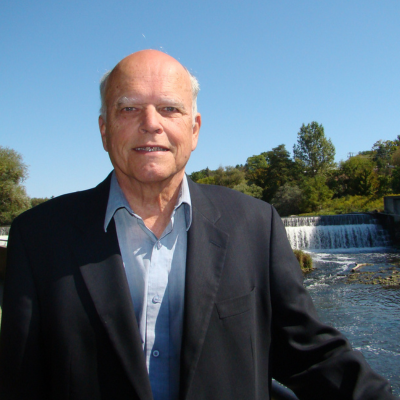

Derek Coleman is a recognized pioneer in the field of environmental and ecological planning. He was one of the country’s first planners to demonstrate how a science-based approach could support the inclusion of environmental considerations into the planning process. In the 1970s, he founded one of the first environmental/ecological consulting firms, and over an extensive career, Dr. Coleman has helped set the standard for environmental planning in Canada.
He has been a leader in educating the planning profession on how to survey, analyze and plan in a manner that protects environmentally important landscapes, species, wetlands, forests and shorelines. He has worked on over 1,000 projects in eight provinces and collectively this work has helped to protect the natural environment in Canada. As a committee representative, Dr. Coleman helped develop the municipal- class environmental assessment regulations in Ontario and in a similar role, he contributed to drafting the regulations for the Canadian Environmental Assessment Act.


Russell Mathew is a partner at Hemson Consulting Ltd. with nearly 40 years of professional experience in growth management, long-range planning, and demographic and economic forecasts. During his distinguished career, he has undertaken growth management related planning assignments across Canada.
Russell’s career has focused on the development of sophisticated demographic and economic forecasts at the provincial, regional, and municipal level. This expertise has included housing, non-residential space and land need projections used at every level of government. Russell’s forecasting work is based on his expertise in analyzing market dynamics and planning for the economic base as a foundation to urban and regional growth management. He has prepared a wide range of economic and growth-related studies for varying scales from super-regional to traffic zones. Russell is a speaker, mentor, volunteer, and active community member.


Based in Manitoba, Somia Sadiq is a leading planner who has developed a pioneering practice in engagement, conflict transformation, and negotiating space for those whose voices are often unheard or ignored. Rooted in the work of impact assessment, Somia founded Narratives Inc., a planning firm that emphasizes human-centric, trauma-informed story work, lived experience, and creating space for celebration of ancestral identity. Somia is also the founder of Kahanee, a non-profit organization that works nationally and internationally amplifying storytelling and facilitated dialogue for peacebuilding.
Somia began her professional planning career undertaking impact assessment with a focus on resource, energy, and infrastructure projects. Her Master’s Thesis focused on Free, Informed, and Prior Consent (FPIC) by Indigenous communities in mining projects, and led to a series of recommendations for reforms in impact assessment process and legislation in Canada. Her Doctorate focuses on understanding the role of Identity, Othering, and Trauma in conflict transformation.
Honorary Member
This prestigious distinction recognizes non-planners, such as educators, journalists, civil servants, and community leaders, who have made a significant contribution to the discipline of planning.


Alan DeSousa has been a strong advocate for planning over his career in government. He has been Mayor of Saint-Laurent, City of Montreal since 2001, providing leadership in the promotion of sustainable development, environmental preservation, and green building through policies, plans, and programs. In addition to his sound administration in Saint-Laurent, he actively supported initiatives related to heritage protection, creative architecture, public transit, active transportation, and the role of enlightened planning at the provincial, metropolitan, and local levels. He has been a long-time advocate for a provincial-wide planning and architecture policy and, after much consultation, such a policy was adopted in Québec in 2023.
During his many years in public service, Alan spearheaded the adoption and implementation of the Montreal Sustainable Development Plan, the Montreal Economic Development Strategy (including an Urban Design Policy), and the Montreal Metropolitan Community Policy on Protecting Natural Areas for 17% of the metropolitan area. He stewarded a number of development projects that embodied innovative planning practices including Bois-Franc, a successful New Urbanist, transit-oriented development, considered among the 50th best projects in Québec, according to Ordre des urbanistes du Québec, and transit-oriented developments appropriate to their locations around the Bois-Franc and Du Ruisseau train stations. He also advocated for an extensive component dedicated to the preservation of natural areas within the first high technology business park in Canada.
Saint-Laurent is a highly diversified community from a racial/ethnic, linguistic, and socioeconomic point of view. Much of Saint-Laurent was originally developed in the mid-20th century with a focus on accommodating large volumes of vehicular traffic. Saint-Laurent does not have the social composition and urban form that are typically associated with strong environmental agendas. One of the ways Alan has raised his community’s awareness of environmental issues is by influencing the blending of environmental and other urban planning objectives with the day-to-day concerns of the residents of Saint-Laurent, in ways that stress the relevance and importance of these objectives to their community.
Alan has received many awards over his career, among them two awards which pertain most directly to his planning, environmental and heritage preservation initiatives: the Jean-Paul-L’Allier prize from the Ordre des urbanistes du Québec in 2015 and the Frederick-Todd prize from the Quebec Association of Landscape Architects in 2023.
Emerging Planner Award
This award celebrates the leaders of tomorrow, recognizing outstanding professional success and achievement in the first ten years of a planner’s career.
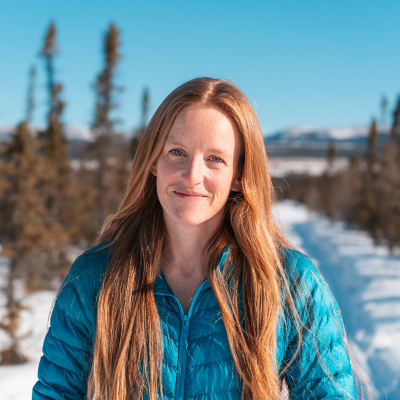

Melanie Harding is a planner with the Ɂehdzo Got’ı̨nę Gots’ę́ Nákedı (Sahtú Renewable Resources Board) in the Northwest Territories, where she leads work relating to Hıd̨ó Gogha Sęnę gots’ıɂ̨á (Planning for the Future) which focuses on community-led plans for conservation of wildlife and their landscapes in the Sahtú Settlement Area. She is a strong advocate working to build creditability and acceptance of Indigenous ways of planning and conservation in the face of deeply entrenched colonial approaches to planning and conservation in the Northwest Territories and in Canada. She works closely with Elders, language speakers, knowledge holders, and land users in articulating Indigenous ways of planning and embedding them in community and conservations plans.
Melanie is an Instructor in the University of Alberta’s Planning School for an undergraduate/graduate course on Community Planning with Indigenous Communities. In her classes, she coordinates Indigenous planners as guest speakers to share their perspectives, experiences, and wisdom with students and guides students in understanding the colonial legacy of the planning profession, current implications in planning work, and how to use this knowledge in their careers. She also returns most years to the Indigenous Community Planning program at SCARP/UBC, where she graduated in 2014, to share her learning with new cohorts of the ICP program.
She is a former member of CIP’s Indigenous Community Planning Committee, where she contributed to the development of CIP’s Policy for Planning and Reconciliation. She has been a member of the National Indigenous Advisory Committee for Indigenous and Northern Affairs Canada, which is guiding the development and Implementation of INAC’s National Community Development Strategy.
Melanie was the Project Manager and Lead of the Nishnawbe Aski Development Fund’s Comprehensive Community Planning Toolkit: Finding Bimadizowin, which won the CIP Award for Planning Excellence in Planning Publications in 2018. The toolkit was intended for northern Ontario Indigenous communities, but has been referenced by the BC Aboriginal Child Care Society, the University of Saskatchewan, the Red Circle Planning Group, the IPCA Knowledge Basket, numerous Indigenous planning projects, and publications from Toronto Metropolitan University. For many local community planners, this toolkit has been the introductory textbook on planning, often along with trainings organized by Melanie.
Melanie also contributes to the profession as a network builder. Through her efforts to support communities, she has brought together a wide range of planning professionals either as consultants or as speakers and trainers at the various conferences and gatherings she has organized. This network of Melanie’s has evolved into an informal think tank of planners working in Indigenous spaces, constantly sharing resources and checking in with each other about best practices and ethics.


Victor Ngo is a Senior Transportation Planner with WATT Consulting Group, where he works on multi-modal transportation planning and engineering projects in urban, rural, and Indigenous communities throughout Western Canada and co-leads WATT’s Vancouver office to oversee projects in the BC South Coast region. He is a Rick Hansen Foundation Accessibility Certification Professional, where he incorporates universal design principles to create more accessible and barrier-free communities. Victor’s practice spans the provincial to site scale, where he works with local governments, public sector organizations, and non-profit & private landowners on a variety of pressing policy, strategy, and design challenges. Victor holds a MA in Planning and BA in Geography from the University of British Columbia (UBC).
In addition to his active consulting work, Victor has been involved in applied research at the intersection of urban planning and public health as a Research Associate at the Health & Community Design Lab in the UBC School of Population and Public Health. Victor’s work has been published and cited in a range of academic journals on various topics from urban greenways to capacity-building and community engagement for climate change action.
Victor has been active as a volunteer supporting the planning profession in a number of roles. He regularly serves on the Professional Standards Board’s Accreditation Site Visit Teams and has represented CIP on various national initiatives, including with the Public Health Agency of Canada, Natural Resources Canada, and the Transportation Association of Canada. Victor has made presentations, moderated discussions, and led workshops at both CIP and PIBC conferences. He also regularly mentors students at the UBC School of Community and Regional Planning.
In the community, Victor volunteers with youth and sustainability-related non-profit boards and committees, including as a board director with The Starfish Canada, a member of the Youth Program Advisory Committee at the Fraser Basin Council, and a member of the Youth Vital Signs Leadership Council at the Vancouver Foundation. He was also a member of the Development Permit Board for UBC Campus and Community Planning.
Amplifying Your Achievements
CIP is committed to celebrating the milestones and accomplishments of planning professionals throughout their careers. Our Digital Badge Program, powered by Credly and verified by CIP, plays a key role in showcasing these achievements.
CIP digital badges are awarded for various professional accomplishments, including membership status (e.g., MCIP® and Candidate), volunteer contributions, prestigious honours, and participation in CIP-recognized professional development programs and courses. This program not only recognizes individual achievements but also provides a transparent way to share how they were earned, empowering members to highlight their expertise and career progression.
We would like to extend our heartfelt thanks to all our members who generously volunteered their time, expertise, and passion throughout the year. Your dedication and commitment to advancing the planning profession, supporting your peers, and strengthening our community make a profound impact. Thank you for your unwavering commitment to CIP and the planning profession.
Celebrating Our Volunteers
CIP’s work wouldn’t be possible without the dedication of our members who volunteer their time, knowledge, and expertise. Thank you for your dedication and service.
Thank you to the 2024 CIP Staff Team
Beth McMahon, Chief Executive Officer
Karen Meades, Interim Chief Executive Officer
Valérie Broadfoot, Director, Operations
Kristen Harrison MRAIC, National Director, Policy and Public Affairs
Marisa Lingard, Director, Member Services
Anita Badovszky, Coordinator, Communications
Rebecca Judd, Officer, Communications
Shahzad Khaliq, Specialist, Finance & Technology
Matthew Klaas, Specialist, Member Experience and Systems
Laurie Langlois, Manager, Member Engagement
Naseem Mohajer, Manager, Events and Learning
Lauren Murray, Manager, Communications
Janet Riehm CPA, Chief Financial Officer
Kerry Tilden, Financial and Administrative Coordinator
Wendy Vance, Manager, Projects and Events
Hannah Whitworth, Officer, Honours and Awards









